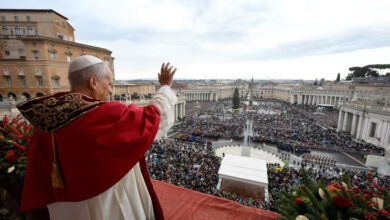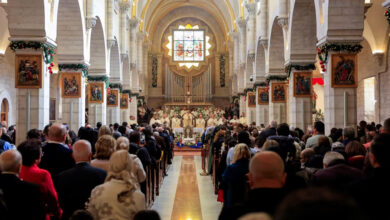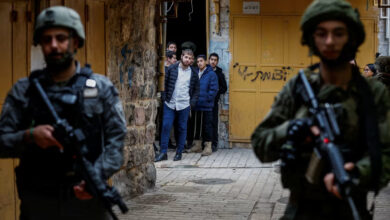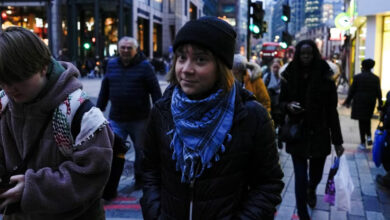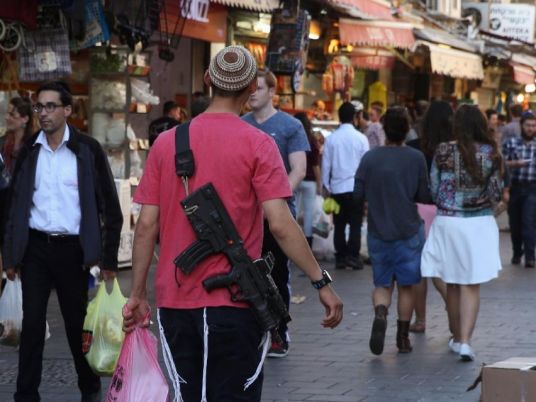
Cars are double- and even triple-parked outside a gun shop in Israel's coastal city of Tel Aviv. Inside, customers jostle each other as they wait to be served.
Israelis fearful of a rising number of knife and other attacks by Palestinians are increasingly turning to firepower for personal protection.
Seven Israelis and around 30 Palestinians have been killed in an upsurge of unrest since October 1, with many of the attackers wielding blades.
One man at the store does not even bother to remove his motorbike helmet or interrupt a call on his mobile as he orders and pays for a box of bullets.
"The last time the shop was so busy was probably in the 1970s. I've never before seen such stress or panic," says owner Iftash Ben-Yehuda.
He is now having to ration some of his wares, estimating demand to be about four times higher than normal.
"There's been a shortage of tear gas grenades in the country for a few days, so I limit them to two per customer and give priority to women," the 37-year-old tells AFP.
Smith & Wesson, Glock and Israeli-made Jericho models top the handgun sales league, costing anything between 2,000 and 4,000 shekels (US$500-$1,000, 450-900 euros), he says.
He has decided not to charge for weapons training "to participate in the public security effort", Ben-Yehuda says.
'A game-changer'
"In a knife attack or a shooting, an armed and well-trained civilian can be a game-changer, neutralizing a terrorist in seconds. This can mean the difference between an attack with one or more wounded and one with several people dead."
Under Israeli law, apart from members of the police and forces and private security contractors, only civilians living or working in areas deemed at risk, such as Jewish settlements in the occupied West Bank and Jerusalem, are allowed guns.
Out of a population of 8.5 million, some 260,000 Israelis hold gun licences.
However, a spokesman for the public security ministry told AFP that in the past 10 days, the number of gun licence applications has risen "by tens of percent".
Israelis would appear to be actively responding to appeals by officials to be vigilant and stay on the alert.
Exceptionally, security guards have been asked no longer to leave their firearms at the workplace, and civilians with licences have been urged to keep their weapons on them — and make sure they are visible.
Jerusalem Mayor Nir Barkat is setting an example.
The former paratrooper, armed with an automatic weapon and spare ammo, invited television crews to join him as he patrolled flashpoint areas of Arab east Jerusalem in his SUV.
'Get the Glock'
Israeli forces took the east of the Holy City in the 1967 Six-Day War, and later annexed it.
In the West Bank, most Jews — men and women — carry guns when they come out from behind the barriers and barbed wire circling their settlements.
"Last week, when my neighbor was attacked by young masked Palestinians who stoned her car and the army took 20 minutes to arrive, I said to myself 'Right, now's the time to get the Glock from the gun safe'," Aviva Yisraeli, a mother living in the Tekoa settlement in the southern West Bank, told AFP.
Since then, whenever she drives anywhere the pistol is close to hand.
Not everyone has welcomed the call to arms.
Lawyer Smadar Ben Natan, a leader of a coalition of anti-firearms groups called Gun-free Kitchen Tables, says a series of welcome regulations has halved the number of civilians allowed to bear arms over the past decade.
She believes it would be "very undesirable" if such policies go by the wayside "at the whim of a temporary situation".
The lawyer cites to AFP the case of a Jew stabbing another Jew on Tuesday in the mistaken belief that he was an Arab.
"In the long run it is obvious that more weapons creates more danger, not more security but the opposite," she says.
"Encouraging civilians to use firearms on the street could lead to very unfortunate results; it is not always easy to tell who is a terrorist or not."

